Editor’s Note: This article was originally published in Overland Journal’s Fall 2022 Issue.
Baptiste Gissinger tells me he grew up on a farm in France, but I’m not so sure. I (not so) secretly think he’s a Viking sent back from Valhalla to teach us overlanders a thing or two. At 15 years old, I spent most of my time playing guitar, attempting kickflips at the local skatepark, riding bikes, and generally being a little outdoor nerd. Meanwhile, 15-year-old Baptiste was riding a motorbike solo up the east coast of India, spending his evenings drinking beer from a teapot.
Occasionally you meet someone whose life story is so fantastical you’re convinced they’re the hero of an adventure novel. Baptiste certainly wouldn’t look out of place fighting White Walkers or as the tenth member of the Lord of the Rings fellowship. You’re probably thinking, “Stop being such a suck-up, Jack.” Oh, I haven’t quite finished singing Baptiste’s praises.
If traveling across 61 countries wasn’t enough, he’s also the founder of Expedition Gin, the vision of which is to travel across all seven continents over 10 years to create unique, small-batch, limited-edition gins using the aromatics and botanicals found in each area. Did I mention he forages all the raw ingredients himself? A Viking, driving a modified Hilux around the world to create gin. Marry me.
Jokes aside, Baptiste is a true overlander and someone who calls into question the piles of gear we overlanders think we need, the highly modified vehicles we drive, and the excuses we give ourselves for not hitting the road. Here is a man who exemplifies uncorrupted overland travel, who has seemingly lived nine lives already and has only just begun.
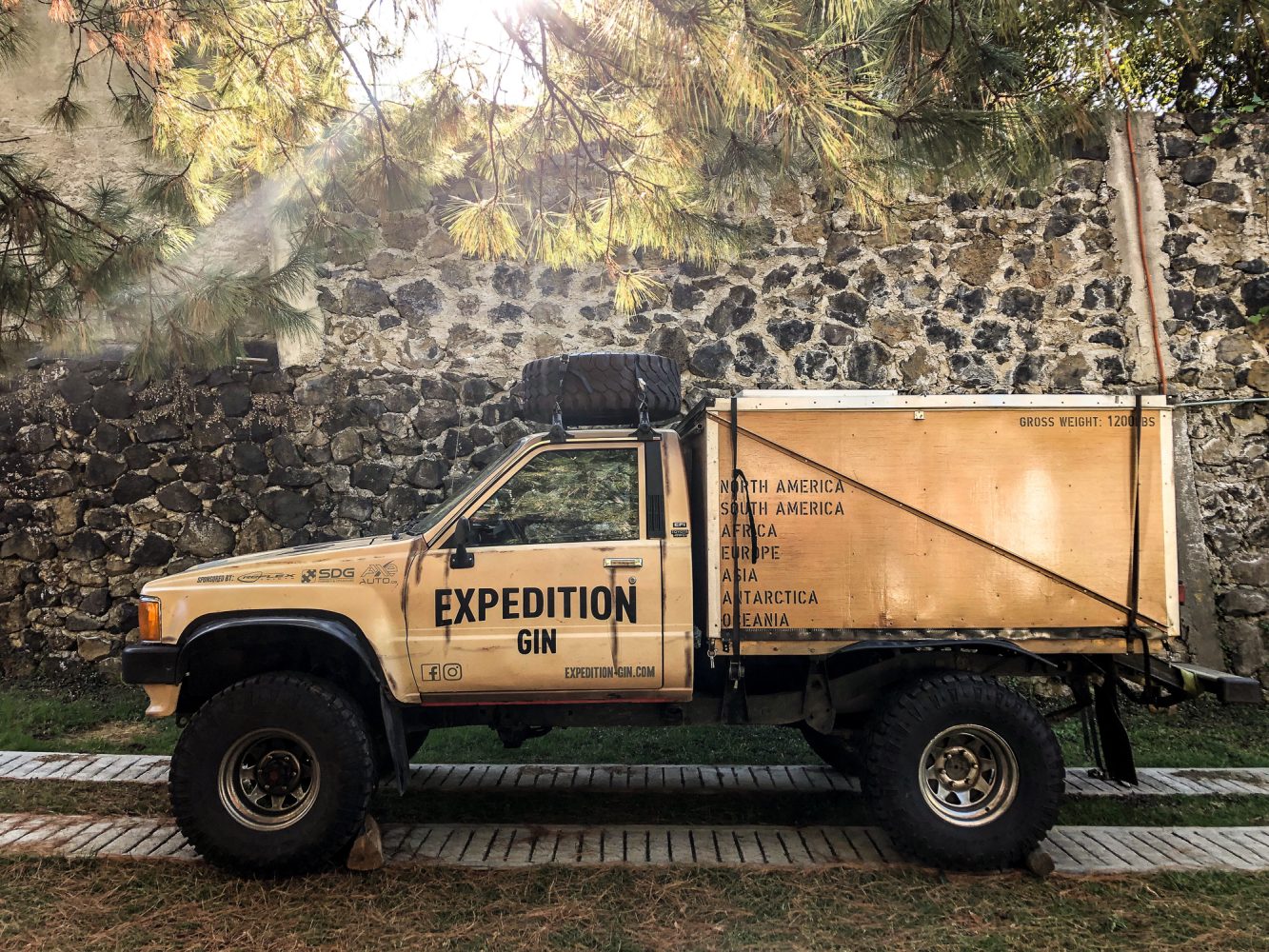
Baptiste, please introduce yourself.
I was born in the Alps in France, but close to Geneva in Switzerland, on a farm that makes cheese. I started traveling very young, and my first big trip was at 15, exploring the whole east coast of India alone on a motorcycle. That was during the prohibition in India, so you couldn’t buy alcohol in restaurants. You’d have to order “special tea,” which was beer in a teapot hidden under the table. This is where it all started, a true taste of freedom.
I returned to France and attended business school, but at 24, I went on a four-year backpacking adventure around the world to approximately 50 countries. This meant living and working in different places; jobs in China, Vietnam, Australia, the USA, Canada, and Europe. I finally settled in Quebec 14 years ago. In Canada, I owned and ran two restaurants with my brother, working seven days a week for five years—no vacation or traveling—it drove me crazy. In 2016, I sold both restaurants, flew to Vancouver, bought a campervan, and went straight to Ushuaia. I traveled in South America for six months, [through] 15 countries, and that’s where I had the idea to create Expedition Gin.
I fell in love with making spirits when running the two restaurants. I learned everything about making gin, whiskey, vodka, rum, etc. I was distilling in my basement, figuring out the process. My goal when I sold the restaurants was to work in the spirit business while continuing to travel. I had this big idea that I’d make a gin iconic to a specific location, utilizing the ingredients synonymous with that area. It took two years to build the framework because, like tobacco, alcohol is one of the most regulated things on Earth, so you can’t just make and sell it. You need permits, licenses, to pay fees, it has to go through customs—it’s a nightmare. Making different spirits in various countries around the world is [a formidable task]. Expedition Gin is a collection of 25 gins made in 25 different countries on seven continents. Hence, it’s four gins per continent, and the last one will be in Antarctica.
When did your love of travel and, subsequently, vehicle travel begin?
At just nine months old, my parents took me around Crete on a Vespa, and we spent our nights sleeping in a tent on the beach. India was the experience that made me realize that long-term travel was something I wanted to do for the rest of my life. I returned to France, back to school, but then got caught up in the rat race. At 23, I was managing a supermarket with 25 employees, and it broke me. I quit, sold everything, grabbed a backpack, and traveled around the world. [From ages]15 to 24, I lost sight of who I was and what I wanted with my life, but at 24 I made the change.
Tell us about your current vehicle builds.
I have two rigs, a 1986 Toyota Hilux with the legendary 22RE engine and a 2000 Ford F-350. I always choose my rig based on the quality of the engine, as that’s the one thing that has to be absolutely dependable for overland travel. I’ve owned many vehicles, but the Toyota has been the best. It was rusty when I got it, so I replaced numerous parts and built the camper box in the back. This is the third version of the camper. The first one was a pop-top opening frontward, but on the way back from Mexico, it had a huge leak. I altered the roof by making it open sideways, which provided more interior space, and I lived this way for a year. However, then I was struck with another leak, so I did an extensive rebuild with a nice pop-top that provided better headspace.
The Hilux has been heavily modified and showcases a 3-inch body lift and monster mud tires. Unfortunately, it’s not suitable here in Canada with the numerous vehicle rules/regulations, and I’ve been pulled over by the police here in Quebec for the upgrades. Subsequently, I’m waiting to ship it to South America, where I can enjoy it. In the meantime, I purchased the 2000 7.3-liter F-350. This was also chosen for the engine, released before they changed the emission rules. Consequently, I can drive it down to South America without requiring any modifications to meet regulations. The F-350 is fitted with a 2018 Palomino SS 1250 pop-up camper, and it’s pure luxury for me. The camper provides a shower and toilet—everything’s electric and comfortable; it’s awesome.
I’d previously spent three years living very minimalistic in the Toyota, which I love because it’s light, compact, and goes everywhere. I remember doing some hardcore 4WD trails in Utah, and the rangers couldn’t believe my home-on-wheels made it up them. I’ve been to so many places in the Hilux that I wouldn’t dare in the F-350, which is both wider and longer (it’s the dually). The Toyota is roughly 16-17 feet, and the Ford is 20 feet, so there’s a huge difference in size. The Ford is very comfortable for longer trips, whereas the Toyota is harder on those big drives. However, the latter gets me places while having the added benefit of being built and sold around the world, which makes finding parts and repairs overseas easier. I’ll keep both; the Ford will stay here in North America and will be used for Canada, the US, Mexico, and Guatemala. The Hilux will be shipped to South America, then Africa, Europe, Asia, and finally, Australia.



How have your vehicles contributed to the adventure component of your life?
I picked up a Nissan Vanette in Australia, and it was really rough, a banged-up painter’s van. I built a bed in the back out of bricks and wood I found in the street, but it got me around Australia just fine. I had a few issues, but nothing serious, despite driving it on some super tough trails. At the time, I wasn’t looking for a specific Japanese vehicle. But it was cheap and running, and in the end, I was impressed. I lived in it for a year around Australia, big miles on harsh roads.
I then bought the Suzuki DR 600 motorcycle with the plan to ride it from Paris to Beijing, but the engine exploded in the Arctic Circle. I didn’t realize that the head cylinder seal had been poorly repaired, and it was running on borrowed time. It made it through Germany, Norway, and the North Cape, but back through Finland, the seal failed, and oil went everywhere. I had to give the bike away as it would’ve taken three weeks to get the parts, and the price for spares was more than what I spent on the bike, so it didn’t make sense. Undeterred, I traveled onward via train and bus through Russia, Mongolia, and China. I then bought a Mitsubishi Delica L300 4×4 in Vancouver and used that to do the Pan-American Highway. Honestly, alongside the Hilux, it was the best overland vehicle I’ve ever owned. It was the 2.5 turbo-diesel and had done 240,000 kilometers. I bought it cheap and drove it 40,000 kilometers without a single issue. Unfortunately, I had to sell it in Chile and fly back, as I didn’t have a spare six months to drive home. I was going to buy another, but it’s right-hand drive, and this can be an issue in some countries. For example, in Costa Rica, it is forbidden. This is a problem, as you need to cross Costa Rica to reach Panama—there’s no other way besides shipping. In the end, I bought the left-hand-drive Hilux.
There’s a real purity to the way you travel—beautifully simple and close to nature. The vehicles are fit for purpose but not excessive. Can you share some thoughts on this?
I grew up a very solitary boy, and I need isolation sometimes, away from people. As we discussed, I grew up on a farm, so perhaps that’s why I love the quiet. That said, I’m very close to my parents and siblings and loved having them around growing up. The vehicles I choose don’t need to be fancy, but they do need to be fit-for-purpose, which is getting as far away from civilization as possible.
What’s your advice for someone considering their first overlanding adventure?
The simpler, the better; the lighter, the better. The truth is you always pack things you’ll never need, so be ruthless and pack light. After all, if you’re missing something, you can always buy it on the road. Don’t overthink things; it’s too easy to talk yourself out of leaving—just hit the road.
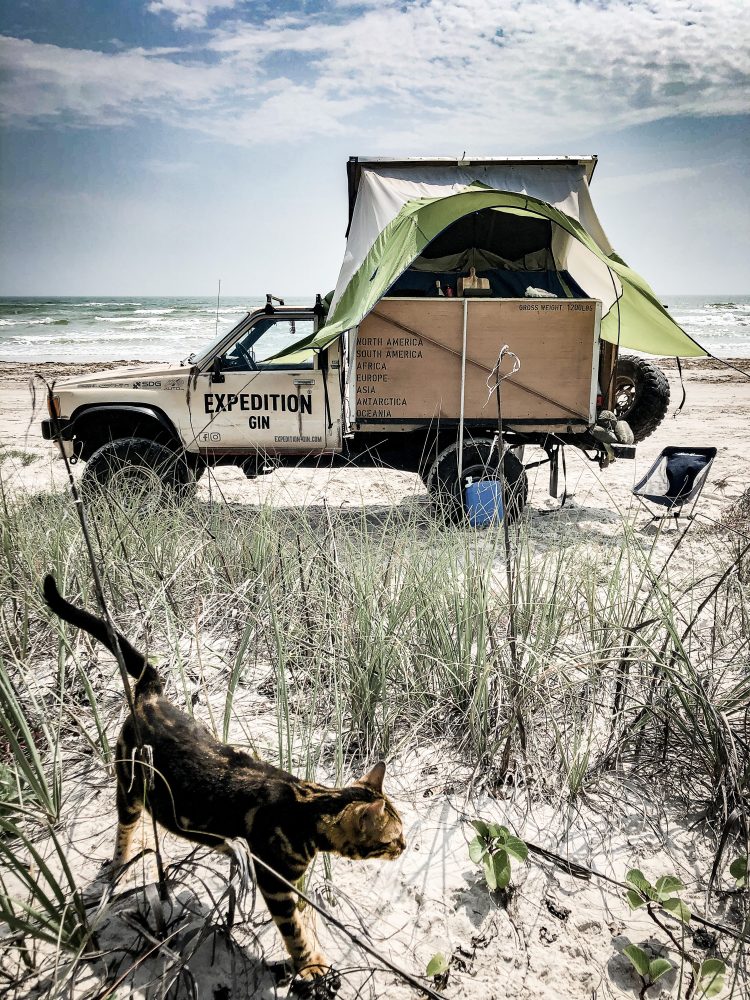
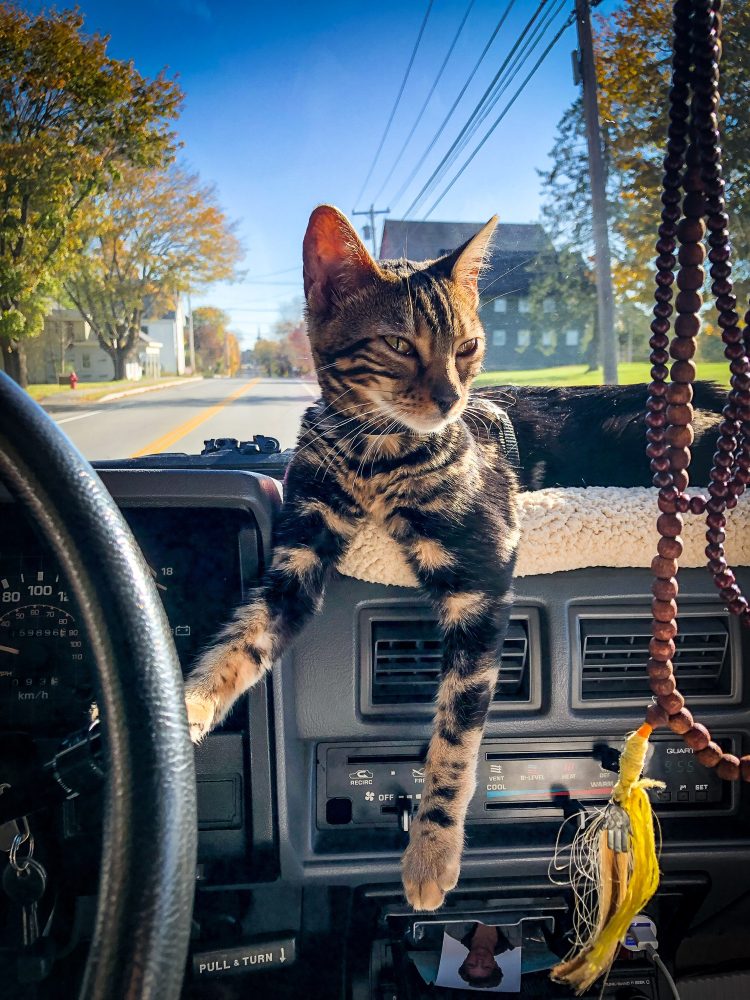

How did Expedition Gin come to life?
I was traveling from Vancouver to Ushuaia via the West Coast of America, driving through Washington State along the Oregon Coast, making my way into Northern California. And there was a different smell and ambiance in each place. It was a light bulb moment; I realized it was all down to the changing trees, plants, air, temperature, etc., that characterized that area, and I wondered if that could be bottled. Gin was the perfect option, as I consider it as elegant and complex as perfume. I actually went to the South of France, Grasse, the perfume capital, and trained as a Nose or perfume maker. I use the skills I learned to create my gins; it should always tell a story.
It’s amazing that you forage all the key ingredients for your gins. Can you tell me a little about that process and the challenges involved with sourcing the raw ingredients?
It’s a long process, and that’s the thing people don’t understand about my work. Bottles are scars, rare to get, and very expensive. People are quick to assume I make lots of money because the bottles are pricey, but it couldn’t be further from the truth. I don’t live a luxurious life; it just costs a lot to make. It usually takes one or two months [for me] to forage the botanicals to make 500 bottles. That’s a couple of hard months in the wilderness, followed by a partnership with an existing distillery because I don’t own one (and don’t want to), which is also expensive. In order to make the Canadian gin, I went around Eastern Canada: Quebec, Labrador, Newfoundland, Nova Scotia, and New Brunswick. I foraged numerous aromatics and botanicals, including indigenous juniper berries in Newfoundland which grow on the eastern coastline. That alone took me three weeks—every single day on my hands and knees.
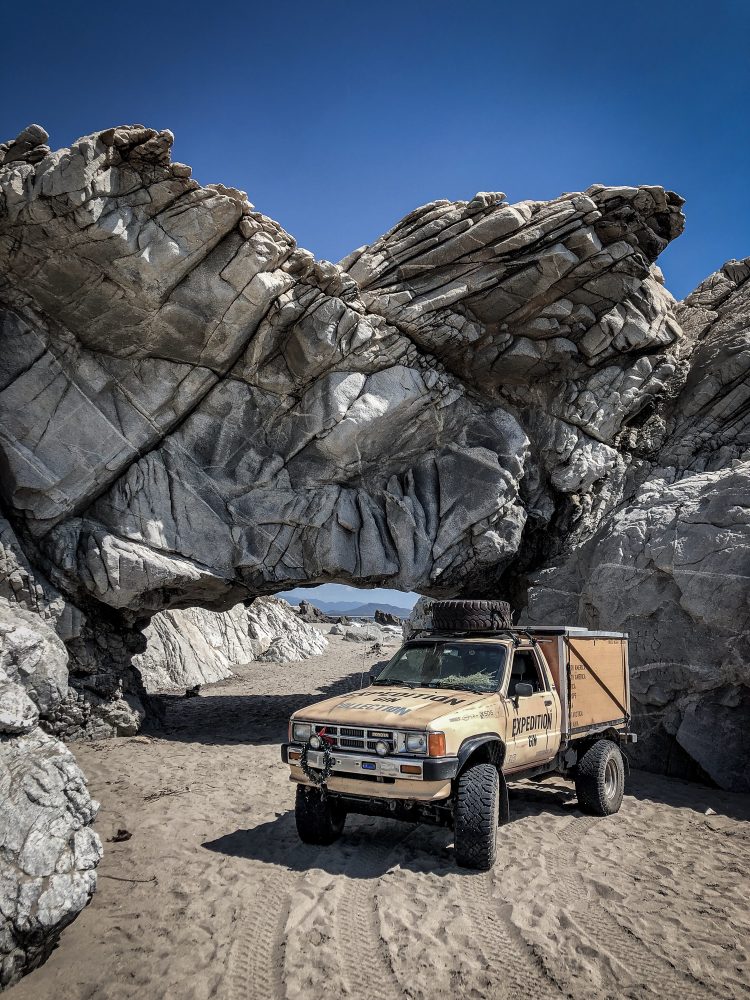

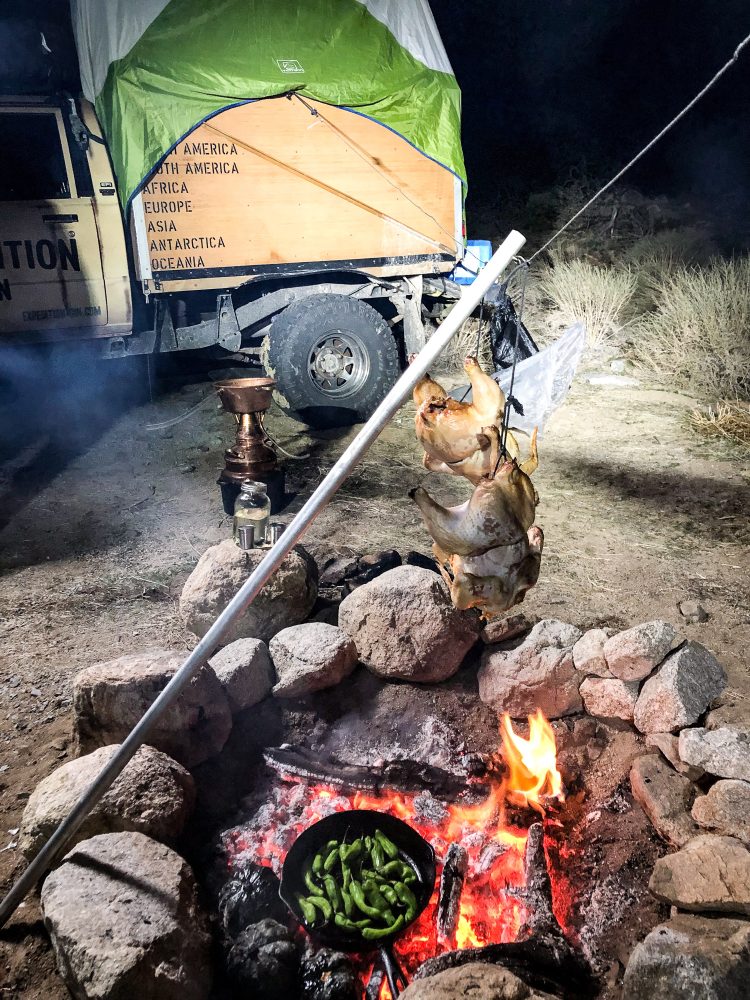
At 61 countries and counting, you are unquestionably a hardcore adventurer. What does travel mean to you?
When I was 21, I worked at a disabled center with kids and grown-ups for a year. That’s when I realized I was the luckiest man on Earth because I was able to walk and do what I wanted without help. I made a promise to myself to enjoy life to the fullest and do everything I wanted to do before I die. Life is short—traveling is keeping that promise.
Looking back, is there anything you would do differently?
Life wasn’t easy. I lost it all once and was living on the streets. That was the hardest experience of my life; I felt so ashamed. Sure, I could wish to go back and prevent that [from] happening, but it made me who I am. I wouldn’t change a damn thing. I wouldn’t give my teenage self any advice besides telling him to make mistakes but to take responsibility and own them. I think that’s most important to me.
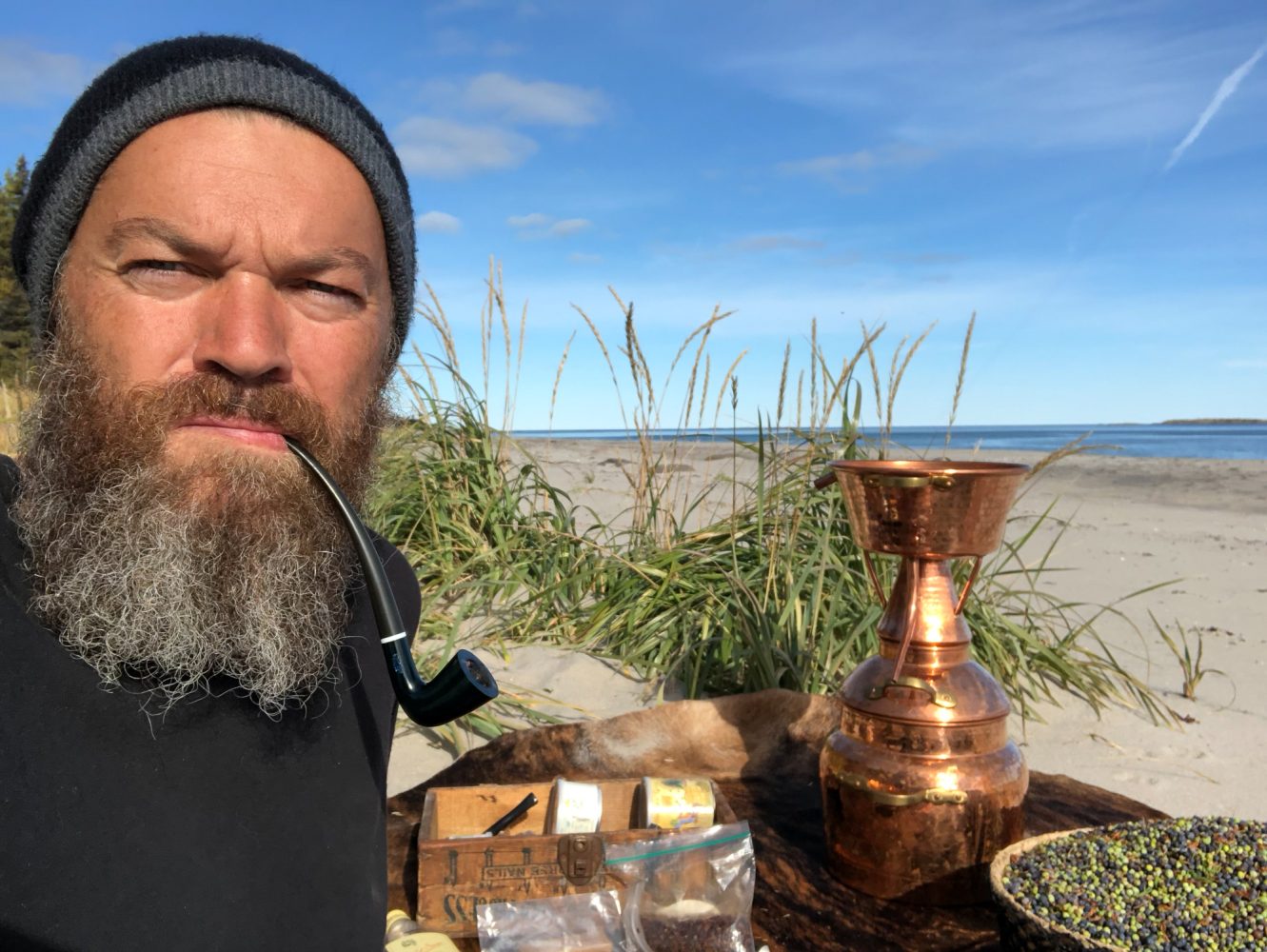
Our No Compromise Clause: We carefully screen all contributors to ensure they are independent and impartial. We never have and never will accept advertorial, and we do not allow advertising to influence our product or destination reviews.
Read more: Modern Explorer :: Lilli Mixich


